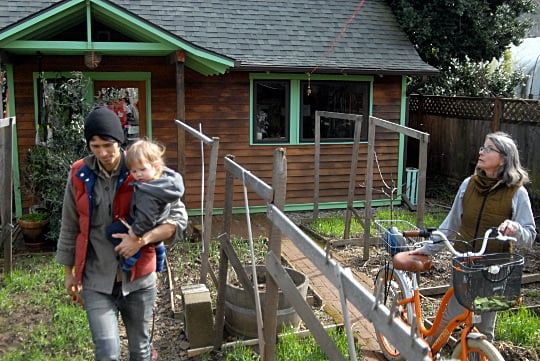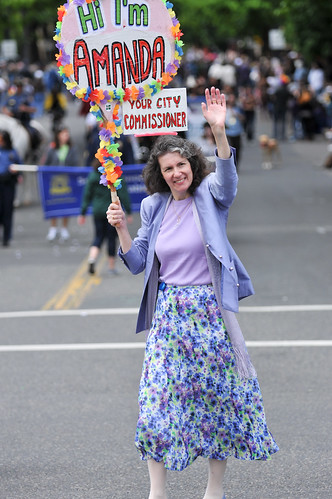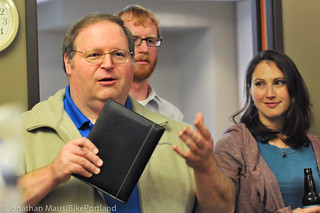
(Photos by M.Andersen/BikePortland)
Until this week, Portland seemed poised to eliminate one of the many ways it prioritizes housing for cars over housing for people.
For decades, there’s been exactly one way to build a 15-foot-tall structure up to the edge of most Portland property lines: put a car in it.
Want an accessory dwelling unit the same size as a garage? Sorry, that’ll have to be set back five feet from the property line, even if it has no windows or doors facing the property edge.
Bike sheds currently face the same restriction: unlike garages that were designed for cars, bike sheds must be at least five feet away from the property line in all single-family residential zones.
(Though the city’s code describes a garage as a “covered structure designed to provide shelter for vehicles,” the city says that legally, “vehicle” implies “motor vehicle” in this context.)
Since January, the Bureau of Planning and Sustainability has been working on a project to rewrite its “accessory structure” code, allowing ADUs and sheds to be built anywhere a similarly sized garage can be built, as long as it’s no more than 15 feet tall at the peak and 10 feet tall by 24 feet wide on any wall close to a property line.
These changes would apply in R-2.5 townhome/skinny zones as well as the more common R-5 and R-7 zones; the large R-10 zones would keep requiring larger five-foot setbacks.
On Wednesday, though, Commissioner Amanda Fritz introduced an amendment that would allow small bike or tool sheds in any situation where a garage would be legal, but not housing units.
Allowing housing units to be built in a spot where a similarly sized car storage unit could be built, she argued, “severely impinges on the property rights of the adjacent neighbors.”
Doubts about light, air, Airbnb
Here’s Fritz’s view in more detail:
I know there is a lot more people who are going to be a lot more people interested in this issue, both pro and con, who aren’t able to be here today. …
In all of when I’m making decisions on the council and elsewhere I think about, would I like this if it was going to happen to me? … The wall could be 10 feet high, 24 feet long, right on the property line on the sides of my property. it would be particularly challenging in my situation because the lots behind me, the lot line is in the center of my back property line. so in fact although it says that each property can only have a 24-foot limitation, I could have two of them sat right next to each other for 48 feet of 10-foot blank wall right on my property line. Since I live on a slope, it would actually be higher than 10 feet, because the properties behind me are at least 10 feet higher than mine. I could then have another one on the other side of my property that would have another 24-foot blank wall, again five feet higher than my backyard, and that would significantly impede on the light, air and separation of my home and my ability to enjoy my property. Not to mention the fact that the owners of the accessory dwelling units would have to access my property to paint the blank walls and otherwise maintain them. …
Commissioner Novick has brought up the issue that since we first did the accessory dwelling unit regulations back when I was on the planning commission, we have changed the regulations for and allowed Airbnbs and other short-term rentals. … so there’s a big incentive for homeowners to use accessory dwelling units not as rentals or low-cost living for relatives, but for commercial enterprises. …
Though we’ve heard a lot of support from those who want to do accessory dwelling units, I haven’t heard any concerns or support from those who are just fine with having these structures right on their property line.
At Wednesday’s hearing, one woman testifying pointed out that Fritz’s nightmare scenario for her property would be just as likely to happen with car storage units under current law; the only difference would be that they would be housing people instead of cars.
Fritz replied that she had initially wanted to ban garages near property lines as well, but was persuaded not to do so because it would bring huge numbers of garages around the city out of compliance with code.
Under Fritz’s proposal, a property owner could still build a small ADU close to their lot line by spending $2,000 for an additional level of city review that would require notifying neighbors of the proposal. That’s also the case today for ADUs and bike sheds, but it’s not required for new garages.
Advertisement
Two of the five city council members immediately spoke in opposition to Fritz’s amendment. Here’s Commissioner Dan Saltzman:
There is an affordable housing crisis in this city right now, and we are sort of slowly putting the nail in the coffin of accessory dwelling units, we the city and the county. We plan to have our SDC waivers expire next year. The county has an interpretation on reassessments of property values when somebody builds an ADU that significantly increases people’s property taxes, and I think this amendment is only going to make, by going through an adjustment committee, as I said one more nail in the coffin of a viable option that’s not being used for Airbnb purposes only. These are people who are living with older relatives, housing aging parents, housing siblings who haven’t made it on their own yet, so I think there’s a lot of valid uses for ADU and we’re slowly killing them off.
Mayor Charlie Hales said he was “initially pretty favorable” to Fritz’s proposal but had changed his mind after talking to “our professional staff.”
The other two council members, Steve Novick and Nick Fish, said they were undecided on the amendment.
Fish said he’s especially worried about the city’s decision to legalize short-term rentals using sites like Airbnb.
“We have greatly contributed to the crisis in our community by allowing people to do short-term rentals instead of long-term rentals,” Fish said.
Novick said he had favored Fritz’s proposal at first but after hearing from other people involved in the process “would like further time to think about it.”
In an interview Thursday, city project manager Phil Nameny described legalizing garage-sized ADUs near property lines as “kind of the most anticipated change we were making” during the process.
‘As close to an unalloyed good for housing as we are likely to find’
Several people involved in the process weighed in by email.
Here’s Chris Smith, a member of the planning and sustainability commission who voted for the proposal when it was endorsed by that volunteer committee:
1) The production of legal, permitted ADUs is as close to an unalloyed good for housing as we are likely to find in Portland. These are compact, sustainable, generally affordable homes that have been demonstrated to be compatible with existing single family neighborhoods. We should be encouraging these as much as we can. The alternative for owners of single family homes to increase the monetization of their property is demolition and development of an even larger single family home, which contradicts our sustainability and affordability goals, and is often objected to by neighbors.
2) I appreciate the concern about absorption of ADUs in the short-term market. While it’s important to understand what’s happening here, and perhaps to amend (and enforce) our short-term rental regulations, this is a concern related to the current market. ADUs built now will have at least a 50-year life, and even if used for short-term rentals during part of their life, may well be available for longer term housing during much of their life.
3) While I respect Commissioner Fritz’ concern about development to the property line, I disagree sharply that addressing it should be based on the contents of the structure rather than its height and mass. A garage built to the property line has the same impact on neighbors as an ADU of the same height and size built to the property line. Portland is a city where parking is often free and housing is expensive. Regulations that favor cars over people are one of the reasons this is true, and we should remove hidden subsidies like the one the proposed amendment would perpetuate.
Here’s Eli Spevak, a local indie developer who specializes in small housing units:
It’s frustrating that Fritz’s amendment would single out ADUs to be excluded from setbacks, even though same-sized structures for other uses (i.e. garages) are allowed within setbacks and have been for years. Heck – we’ve got a housing crisis for people, not cars!
The council decided on Wednesday to postpone any vote until Dec. 2, in order to give Fritz enough time to ask people about it at a Nov. 30 town hall she’s participating in at Portland Community College.
The council will be taking written testimony until then, but in order to save time it won’t be taking further in-person testimony on Dec. 2. If you’d like to weigh in, send testimony to the city council: CCTestimony@portlandoregon.gov..
— Michael Andersen, (503) 333-7824 – michael@bikeportland.org
The Real Estate Beat is a regular column. You can sign up to get an email of Real Estate Beat posts (and nothing else) here, or read past installments here.
UPDATE, 10:00 am on 12/2 City Council voted on this policy today and it passed 4-1 with Fritz being the sole “no” vote.






